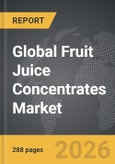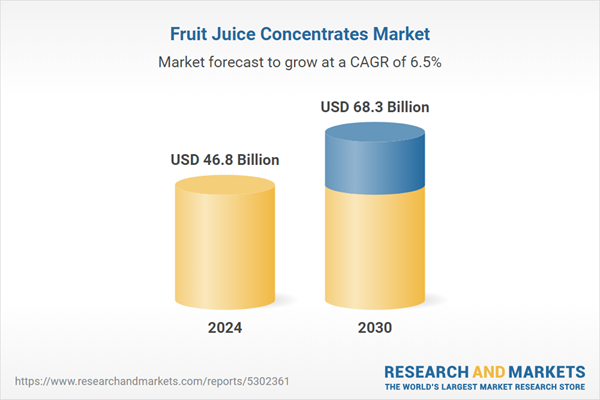Global Fruit Juice Concentrates Market - Key Trends & Drivers Summarized
What Are Fruit Juice Concentrates, And Why Are They Gaining Popularity?
Fruit juice concentrates have become an integral component of the beverage and food industry due to their convenience, extended shelf life, and versatility. These concentrates are made by extracting water from fruit juice, leaving behind a dense liquid or syrup that retains the flavors, nutrients, and essence of the original fruit. The growing popularity of fruit juice concentrates is largely driven by their ability to provide consistent quality and taste in a variety of applications, ranging from beverages and smoothies to processed foods like candies, jams, and sauces. One of the key advantages of juice concentrates is their ease of storage and transportation, which makes them more economical for manufacturers and distributors compared to fresh fruit juices. As a result, juice concentrates are widely used in large-scale food production, where cost-effectiveness and efficiency are critical.The increasing demand for natural and healthy beverages has also propelled the growth of fruit juice concentrates in recent years. Consumers are becoming more health-conscious and are actively seeking products with reduced sugar, no artificial additives, and organic ingredients. Juice concentrates, particularly those derived from organic or exotic fruits, align well with this trend. They offer a more natural alternative to synthetic flavorings or sweeteners and are often marketed as premium ingredients in products aimed at health-conscious consumers. This shift toward healthier consumption habits has contributed to the expansion of the fruit juice concentrate market, as companies continuously innovate to meet the rising demand for clean-label and functional beverages.
What Are The Different Types Of Fruit Juice Concentrates, And How Do They Cater To Various Consumer Needs?
Fruit juice concentrates can be categorized into two main types: single fruit concentrates and multi-fruit blends, each catering to different consumer preferences and industrial applications. Single fruit concentrates, such as orange, apple, or pineapple concentrates, are widely used in the production of fruit juices, flavored water, and smoothies. These concentrates maintain the authentic taste of the original fruit and are favored by manufacturers looking to provide pure, unblended fruit flavors. Single fruit concentrates are particularly popular in regions where consumers prefer simple, traditional fruit juices with minimal ingredients. For instance, orange juice concentrate remains a staple in breakfast beverages across many parts of the world, while apple juice concentrate is frequently used as a base for a variety of mixed fruit drinks and snacks.On the other hand, multi-fruit blends or mixed fruit concentrates offer more complex flavor profiles and are used in the creation of beverages that combine the tastes of different fruits. These concentrates are often found in exotic fruit drinks, flavored sodas, and even alcoholic beverages like cocktails or ciders. By blending fruits such as mango, passion fruit, and guava, manufacturers can appeal to consumers who seek more adventurous or exotic flavors. The versatility of mixed fruit concentrates also extends to the food industry, where they are utilized in making sauces, confectionery, and desserts. The ability to customize flavor profiles according to market trends and consumer preferences makes multi-fruit concentrates a popular choice among manufacturers looking to differentiate their products in an increasingly competitive market.
How Are Technological Advancements Shaping The Future Of The Fruit Juice Concentrates Industry?
The fruit juice concentrates market is evolving rapidly, driven in part by technological advancements that enhance the production process, improve product quality, and extend the shelf life of concentrates. One of the most significant developments in recent years has been the improvement in evaporation and filtration techniques, which allow manufacturers to produce higher-quality concentrates with better retention of natural flavors and nutrients. Modern vacuum evaporation processes, for instance, enable the concentration of juice at lower temperatures, thereby preserving the sensory and nutritional properties of the fruit. This technology is crucial for maintaining the integrity of heat-sensitive vitamins and antioxidants found in fruits like berries and citrus, which are in high demand among health-conscious consumers.Additionally, the rise of aseptic processing and packaging technologies has revolutionized the way fruit juice concentrates are stored and transported. Aseptic packaging, which sterilizes the concentrate and packaging materials separately before sealing them, ensures that juice concentrates can be stored for longer periods without the need for preservatives or refrigeration. This not only reduces waste but also makes distribution more cost-effective, as products can be shipped over long distances without spoiling. Moreover, advancements in freezing technology, particularly in the production of frozen fruit juice concentrates, have allowed manufacturers to offer products that retain freshness for extended periods, making them ideal for seasonal fruits or export markets. These technological innovations are enabling manufacturers to cater to the growing global demand for fruit juice concentrates while maintaining high standards of quality and safety.
What Is Driving The Growth In The Fruit Juice Concentrates Market?
The growth in the fruit juice concentrates market is driven by several factors that are reshaping consumer preferences and industry dynamics. One of the primary drivers is the increasing consumer demand for convenient, ready-to-drink beverages and processed foods that still offer health benefits. As modern lifestyles become busier, consumers are seeking quick and easy nutrition solutions without compromising on health, and fruit juice concentrates offer the perfect balance of convenience and natural goodness. These concentrates can be easily reconstituted into beverages or used as ingredients in a variety of food products, making them a staple for both manufacturers and consumers looking for efficient, yet nutritious, options.Another major factor contributing to the growth of the market is the rising trend toward healthier eating and clean-label products. Consumers are increasingly wary of artificial ingredients, added sugars, and synthetic additives, and they are turning to products that emphasize natural, minimally processed ingredients. Fruit juice concentrates, especially those labeled as organic or derived from non-GMO sources, align with this growing demand for cleaner, more transparent food and beverage options. In response, manufacturers are shifting toward more natural processing methods and focusing on sustainability, both in terms of sourcing and production. Additionally, emerging markets in Asia-Pacific and Latin America, where disposable incomes are rising and consumers are embracing Western dietary trends, are contributing significantly to the expanding demand for fruit juice concentrates. With these trends in motion, the global fruit juice concentrates market is poised for robust growth in the coming years, driven by health-conscious consumer behavior, technological innovations, and evolving food industry practices.
Report Scope
The report analyzes the Fruit Juice Concentrates market, presented in terms of market value (US$ Thousand). The analysis covers the key segments and geographic regions outlined below.- Segments: Product Type (Liquid Concentrate, Powder Concentrate, Other Product Types); Application (Beverages, Bakery, Confectionery, Other Applications).
- Geographic Regions/Countries:World; United States; Canada; Japan; China; Europe (France; Germany; Italy; United Kingdom; Spain; Russia; and Rest of Europe); Asia-Pacific (Australia; India; South Korea; and Rest of Asia-Pacific); Latin America (Argentina; Brazil; Mexico; and Rest of Latin America); Middle East (Iran; Israel; Saudi Arabia; United Arab Emirates; and Rest of Middle East); and Africa.
Key Insights:
- Market Growth: Understand the significant growth trajectory of the Liquid Concentrate segment, which is expected to reach US$31.7 Billion by 2030 with a CAGR of a 7.2%. The Powder Concentrate segment is also set to grow at 6.1% CAGR over the analysis period.
- Regional Analysis: Gain insights into the U.S. market, valued at $12.1 Billion in 2024, and China, forecasted to grow at an impressive 10% CAGR to reach $16.4 Billion by 2030. Discover growth trends in other key regions, including Japan, Canada, Germany, and the Asia-Pacific.
Why You Should Buy This Report:
- Detailed Market Analysis: Access a thorough analysis of the Global Fruit Juice Concentrates Market, covering all major geographic regions and market segments.
- Competitive Insights: Get an overview of the competitive landscape, including the market presence of major players across different geographies.
- Future Trends and Drivers: Understand the key trends and drivers shaping the future of the Global Fruit Juice Concentrates Market.
- Actionable Insights: Benefit from actionable insights that can help you identify new revenue opportunities and make strategic business decisions.
Key Questions Answered:
- How is the Global Fruit Juice Concentrates Market expected to evolve by 2030?
- What are the main drivers and restraints affecting the market?
- Which market segments will grow the most over the forecast period?
- How will market shares for different regions and segments change by 2030?
- Who are the leading players in the market, and what are their prospects?
Report Features:
- Comprehensive Market Data: Independent analysis of annual sales and market forecasts in US$ Million from 2024 to 2030.
- In-Depth Regional Analysis: Detailed insights into key markets, including the U.S., China, Japan, Canada, Europe, Asia-Pacific, Latin America, Middle East, and Africa.
- Company Profiles: Coverage of players such as Agrana Beteiligungs Ag, AGRANA Investment Corp, Archer Daniels Midland Company, China Haisheng Juice Holdings Co. Ltd., Coca-Cola and more.
- Complimentary Updates: Receive free report updates for one year to keep you informed of the latest market developments.
Some of the 48 companies featured in this Fruit Juice Concentrates market report include:
- Agrana Beteiligungs Ag
- AGRANA Investment Corp
- Archer Daniels Midland Company
- China Haisheng Juice Holdings Co. Ltd.
- Coca-Cola
- DOHLER GmbH
- FruitSmart
- Hershey
- Ingredion Incorporated
- Kanegrade Ltd.
- Kerr Concentrates Inc.
- Northwest Naturals LLC
- Pioma Industries
- Rudolf Wild Gmbh & Co. Kg
- Skypeople Fruit Juice Inc.
- Sudzucker AG
- SunOpta Inc.
- Sunopta Inc.
- SVZ
- Welch Foods Inc.
This edition integrates the latest global trade and economic shifts into comprehensive market analysis. Key updates include:
- Tariff and Trade Impact: Insights into global tariff negotiations across 180+ countries, with analysis of supply chain turbulence, sourcing disruptions, and geographic realignment. Special focus on 2025 as a pivotal year for trade tensions, including updated perspectives on the Trump-era tariffs.
- Adjusted Forecasts and Analytics: Revised global and regional market forecasts through 2030, incorporating tariff effects, economic uncertainty, and structural changes in globalization. Includes historical analysis from 2015 to 2023.
- Strategic Market Dynamics: Evaluation of revised market prospects, regional outlooks, and key economic indicators such as population and urbanization trends.
- Innovation & Technology Trends: Latest developments in product and process innovation, emerging technologies, and key industry drivers shaping the competitive landscape.
- Competitive Intelligence: Updated global market share estimates for 2025, competitive positioning of major players (Strong/Active/Niche/Trivial), and refined focus on leading global brands and core players.
- Expert Insight & Commentary: Strategic analysis from economists, trade experts, and domain specialists to contextualize market shifts and identify emerging opportunities.
Table of Contents
Companies Mentioned (Partial List)
A selection of companies mentioned in this report includes, but is not limited to:
- Agrana Beteiligungs Ag
- AGRANA Investment Corp
- Archer Daniels Midland Company
- China Haisheng Juice Holdings Co. Ltd.
- Coca-Cola
- DOHLER GmbH
- FruitSmart
- Hershey
- Ingredion Incorporated
- Kanegrade Ltd.
- Kerr Concentrates Inc.
- Northwest Naturals LLC
- Pioma Industries
- Rudolf Wild Gmbh & Co. Kg
- Skypeople Fruit Juice Inc.
- Sudzucker AG
- SunOpta Inc.
- Sunopta Inc.
- SVZ
- Welch Foods Inc.
Table Information
| Report Attribute | Details |
|---|---|
| No. of Pages | 288 |
| Published | February 2026 |
| Forecast Period | 2024 - 2030 |
| Estimated Market Value ( USD | $ 46.8 Billion |
| Forecasted Market Value ( USD | $ 68.3 Billion |
| Compound Annual Growth Rate | 6.5% |
| Regions Covered | Global |









